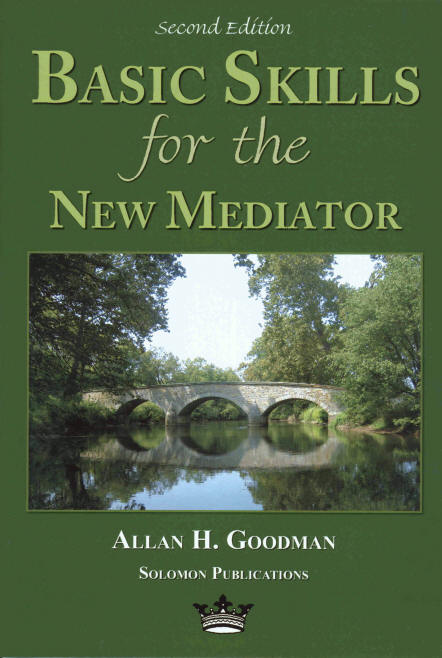The following is excerpted from BASIC SKILLS FOR THE NEW MEDIATOR
by Allan H. Goodman© Allan H. Goodman All Rights Reserved
INTRODUCTION
 Mediation is
probably the least understood method of alternative dispute resolution.
It is often confused with arbitration, and many people use the terms
arbitration and mediation interchangeably. The mediation process allows
the parties to a dispute to select a neutral individual, known as the
mediator, to aid them in reaching settlement. The mediator does not
decide a winner or loser, but facilitates discussions between the
parties.
Mediation is
probably the least understood method of alternative dispute resolution.
It is often confused with arbitration, and many people use the terms
arbitration and mediation interchangeably. The mediation process allows
the parties to a dispute to select a neutral individual, known as the
mediator, to aid them in reaching settlement. The mediator does not
decide a winner or loser, but facilitates discussions between the
parties.Compared to litigation and arbitration, mediation is faster and less costly. When mediation is used effectively, even the most difficult issues can be resolved to the satisfaction of the parties, without the time, expense, and emotional toll exacted by other means of dispute resolution. I derive a great deal of satisfaction from acting as a mediator. The mediator may communicate directly and confidentially with the parties, and work together with them to seek a solution. The non-adversarial nature of the process and the parties' willingness to resolve the dispute creates an environment which often leads to a settlement that is satisfactory to all.
I am amazed at the swiftness of mediation and the magnitude of the disputes that are settled. The parties are also surprised at the effectiveness of the process. The extent to which they may have compromised their claims in order to achieve settlement is often justified by the savings in legal fees and other costs which would have been incurred if other methods of dispute resolution had been used.
This manual suggests answers to one hundred questions a new mediator might ask concerning the mediation process. The answers are based upon my experience as a mediator, and are solely my opinions. Please note that Question No. 101 is your question to ask me. I invite the reader to ask me any question that I have not addressed. I also welcome other suggestions or comments.